3647
Why Choosing Odoo eCommerce for Your Online Store in 2023 Can Be Your Best Bet?
21 Apr, 2023
5 min read
3647
21 Apr, 2023
5 min read
Table of Content
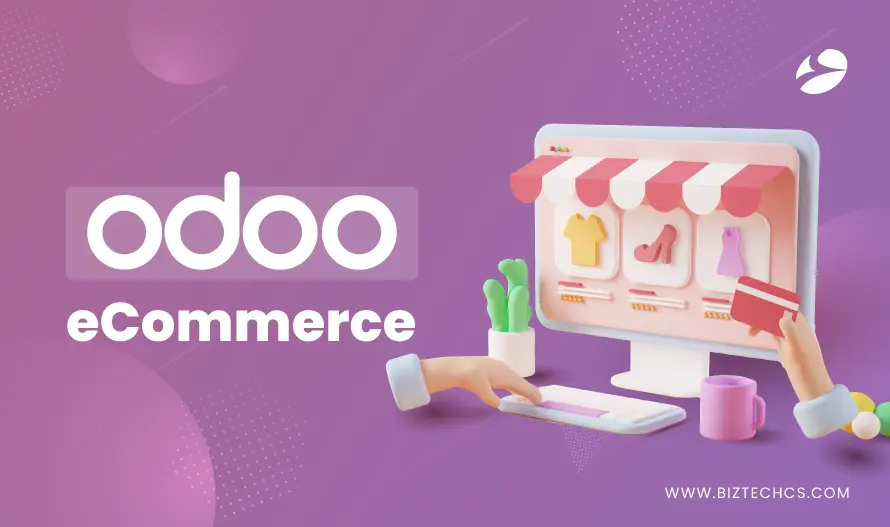
If you are looking for an eCommerce website builder, Odoo might not be the first option to cross your mind. That’s because of its immense popularity as an ERP (Enterprise Resource Planning) software.
However, that’s not all there is to Odoo! It is a suite of business management tools for Odoo eCommerce, CRM, project management, inventory management, accounting, and more. So, if you want to build an eCommerce store, Odoo CMS will make your job easier.
You can also use the other Odoo modules and applications to create a centralized system for all your eCommerce operations.
But, why would you choose Odoo over other eCommerce giants like Magento, WooCommerce, and Shopify? Well, let me help you with everything you must know before choosing Odoo for eCommerce.
Odoo software has several modules to help your business operations. Website builder and eCommerce are two of its open-source modules. You can use them to build your eCommerce store in just minutes.
It is especially beneficial for small-scale businesses and startups that do not have the budget to invest. Not only is it free to use, but also includes the domain name and hosting for your eCommerce store. Yes, you read it right!
Odoo takes care of your website hosting and the domain name, which is free for the first year. After a year, you can switch to a preferred vendor for the domain name. In case you wish to integrate other Odoo modules like social marketing, inventory, etc. with your eCommerce store, you will have to pay charges.
Read Also: Top 7 Benefits of Odoo Customization
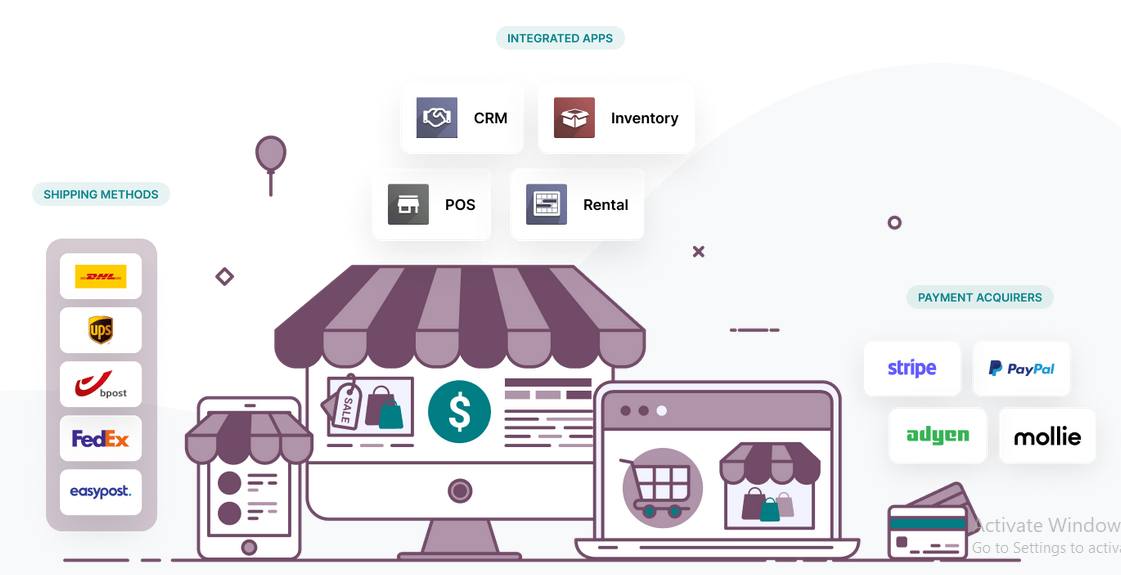
The omnichannel eCommerce architecture helps you reach customers at every touchpoint. It is so you can place your product range smartly in front of the targeted customers. As opposed to the single-channel and multichannel architectures, this method is more helpful with customer engagement and retention.
It is a way to manage your brick-and-mortar retail store alongside your eCommerce store across multiple channels. Unlike the multichannel approach, all the channels are interconnected and in sync.
With Odoo Implementation, you can use various Odoo apps and integrate them to work seamlessly for your eCommerce store. For instance, you can make use of Odoo POS, CRM, inventory, Sales, and Purchase modules together for your Odoo operations.
Here, I have mentioned various key features and functionalities of Odoo eCommerce and website builder. Let’s check!
Read More: What are the Top Benefits of Choosing Odoo As Your ERP Solution
As mentioned above, there are plenty of things you can do to set up and manage your online store effectively. But, what makes Odoo not just an interesting choice but a desirable choice in 2023?
It’s Odoo integration!
With the various ERP, CRM, inventory, and other modules available, you can extend the capabilities of your online store. Let’s look at some of the best Odoo eCommerce integration features/ advantages.
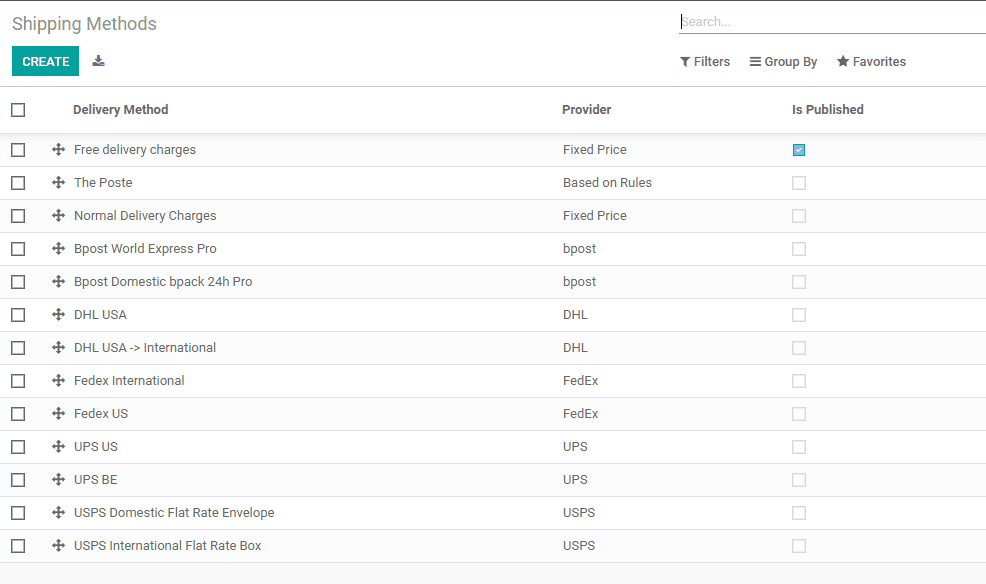
With Odoo eCommerce integration, you will get to optimize your shipping methods substantially. You can integrate directly with logistics like FedEx, USPS, UPS, etc., and track your products in real-time.
Warehouse management, inventory adjustments, creating replenishment strategies, shipping setup and operations, advanced routes, and barcodes are a few things you can do with this integration.
Read More: Odoo Vs ERPNext
It is needless to say that online eCommerce businesses built with Odoo can be optimized for better performance. Let’s look at a few real-life examples.
I. InterVlag
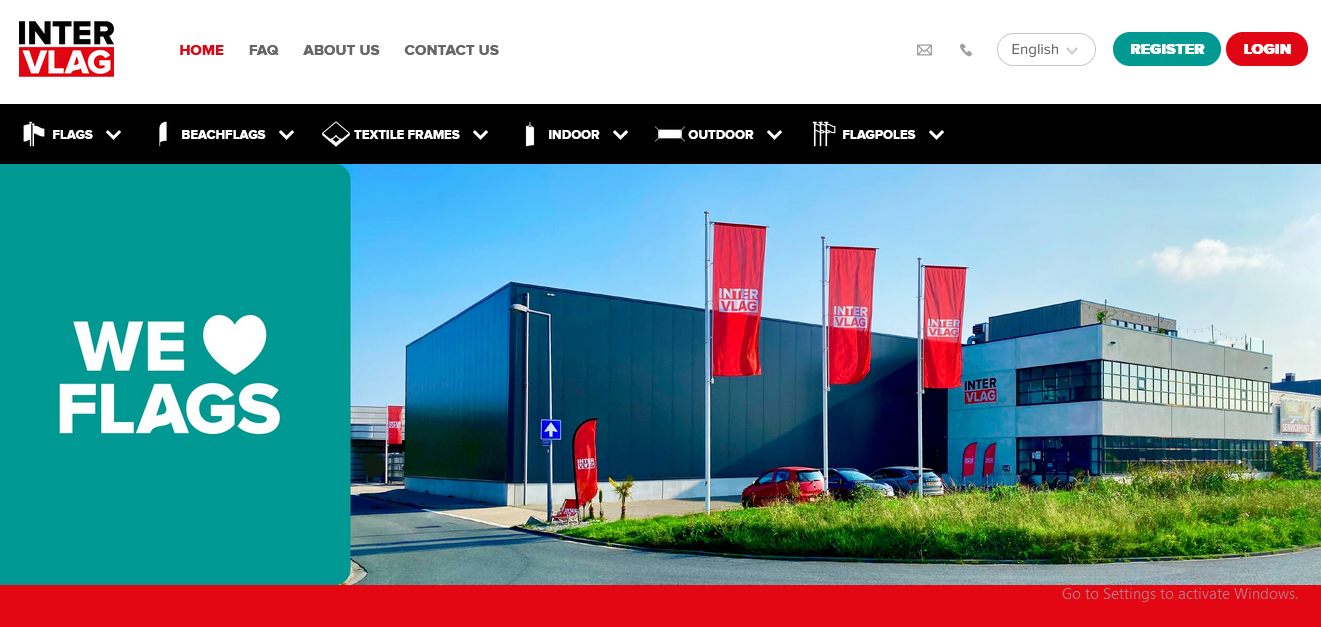
InterFlag or InterVlag is a flag manufacturing company in the Netherlands for resellers. They founded the company in 2010 with the aim to become specialists in the flags and textile market. With their dedication and sheer determination, they are scaling up their business.
To meet the evolving eCommerce needs, InterVlag had its website revamped from Biztech using Odoo. We have been their technology partner for over 6 years and worked on many tasks to utilize Odoo to its fullest potential.
II. Legion Safety

Legion Safety was founded in 2009 and is a distributor of personal protective equipment based in Illinois. The website features a menu in the left corner as well as different categories on the home page itself. It is to ensure that shoppers can easily get the products they want. The website uses Odoo eCommerce and looks clean, precise, and easily navigable.
Odoo’s eCommerce application is undoubtedly one of the best we have today as it gives us complete flexibility and ease. Not to mention, the easy-to-handle centralized system we get to manage all our business operations.
But, how does it compare to other mainstream eCommerce platforms? Let’s find out!
| Odoo | Shopify | |
|---|---|---|
| Features |
|
|
| Setup & Customization | Odoo has a simple user interface and can be seamlessly used for developing eCommerce stores. However, integration with other modules can be tricky. It will be easier if you avail of Odoo development services as the development speed and quality will improve. | Shopify is one of the simplest eCommerce platforms we have today. You can learn to work with the platform in a matter of minutes. You can also find plenty of Shopify tutorials to get started. |
| SEO |
|
|
| Pricing | You can use the Odoo Community version free of cost. However, you must pay for Odoo Enterprise based on the modules you choose. | The Shopify Basic plan starts from $29/month and the Advanced plan goes up to $299/month. |
| Odoo | Magento | |
|---|---|---|
| Features |
|
|
| Backend operations | Odoo has a simple and ready-to-use backend. With the help of various Odoo modules, you can add more advanced operations to your backend. | The Magento backend can be custom-created for various backend operations like order management, catalog management, etc. However, you can add more extensions to manage inventory, purchases, and so on. |
| Setup | Working with Odoo eCommerce is easy and doesn’t require much technical expertise. However, acquiring Odoo development services will ensure more seamless development and setup of Odoo. | Developing eCommerce stores with Magento requires technical proficiency. So, setting up a Magento store is a complex procedure and you will need help from developers. |
While Odoo might not be a mainstream eCommerce platform, it definitely compares to the best and most popular ones. With its diverse range of Odoo apps and modules, you can customize your store just the way you want.
You can also avail of online eCommerce services if you want to customize Odoo apps or implement unique customizations for your store.
Odoo eCommerce presents you with endless possibilities with its multiple modules and omnichannel architecture. The sync between various Odoo modules further makes it easier to manage your day-to-day eCommerce business operations. This guide should help you understand where Odoo stands as an eCommerce platform. Also, our dedicated Odoo Experts are here to assist you every step of the way.
In case you choose Odoo for setting up and managing your online store, we are here to help with the development part. Hire Odoo developers from BiztechCS, an Odoo Ready partner, to get insights on the latest Odoo updates and build highly engaging eCommerce stores.
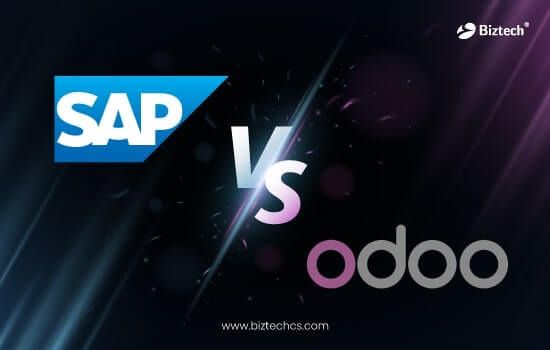
Odoo
7491
By Biztech
04 Jul, 2025
Odoo
125
By Devik Gondaliya
02 Jul, 2025

Odoo
419
By Devik Gondaliya
25 Jun, 2025